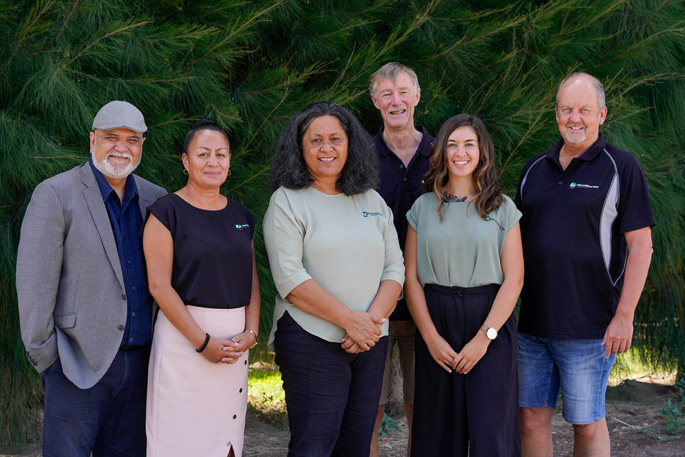Prioritising people and education has helped the Ngai Tukairangi Trust become the largest Maori kiwifruit operation in the country, and an Ahuwhenua Trophy finalist.
That legacy began with Turirangi Te Kani and his cousins, who converted their ancestral land on Tauranga’s Matapihi peninsula from a dairy farm to a commercial garden, to help protect it from urbanisation.
Now, Ngai Tukairangi Trust has 110 hectares of kiwifruit orchards, including 60ha in Hastings. In total, they produce about 1.7 million trays of kiwifruit yearly.
Turirangi’s grandson, Ratahi Cross, has chaired the trust for 13 years. “Being named an Ahuwhenua finalist, in its first horticulture year, is like getting a tick from my grandparents to say we have maintained what they set out to achieve. It’s a great feeling,” says Ratahi.
“It’s extra special for us, because several great grandkids of the Ahuwhenua Trophy founder, Sir Apirana Ngata, work for us, or are related to trustees.”
Never afraid of new
Ratahi says the trust has never been afraid to try new things, and it continues to progress and innovate. “The land started as a commercial garden but we grew such good veggies, our people kept eating them – we weren’t making much money, but our people were well fed!
“As soon as we realised kiwifruit was a more financially-viable option, we changed direction. “When vine-killing disease Psa-V hit, we moved to the resistant G3 SunGold variety straight away.”
As well as helping Ngai Tukairangi get through the Psa crisis, being quick to act also gave them a head-start in the market. “We keep the same attitude today. We have an Active Variety Breeding Programme where new types of kiwifruit are tested, so we get to see new strands first-hand and decide whether they’re beneficial to us.”
The seven trustees prioritise good working relationships with their 54 permanent and 300 seasonal staff by being active, fair remuneration and networking opportunities.
Education is their biggest drawcard, says Ratahi. “There are two ways to succeed, you can win lotto, or give your people an education.”
“Our workers are highly trained. Having their expertise obviously benefits us, but it also lets our staff know they’re valued. Even if they move onto somewhere else, we like knowing that we’ve helped another orchard gain a great asset.”
Education
The trust provides grants at almost every level of education, from truck licences to PhD degrees.
“My grandfather used to tell his workers: ‘I may not be able to pay you $50,000, but I can give your children an education grant that will turn them into $50,000 employees’. I still say that today.”
As a result, Ratahi says they rarely lose staff. “Many of our workers have been here longer than me. Even with our seasonal workers, the same crew come back every year.”
Staff education programmes include trips to organic markets in the Northern Hemisphere to help understand the growing demand. They’ve been doing these trips for 12 years, to help the business eventually become completely organic.
“Our orchards from Opotiki to the Hawke’s Bay have been great to transition to organic, as the land can produce much better without sprays compared to north of Western BOP. We wish we switched sooner.”
Their goal is to operate as sustainably as possible. “We’re currently trialling our first electric buggy. Our aim is to eliminate two-thirds of our fossil fuel requirements within the next three years.
“Water has been kaupapa in NZ for some time now. We manage it by using a computerised programme to monitor our usage.”
Offers for the original land, which is a mere 11km from Tauranga CBD, still roll in today. The business is almost generating as much money as the multimillion-dollar proposals the trust receives. “The fact that this land has been providing for our iwi for more than 700 years is more important than the money.”



0 Comments
Leave a Comment